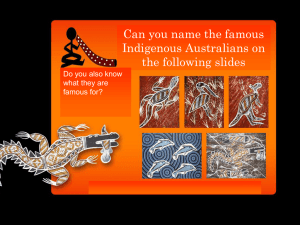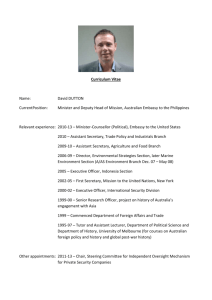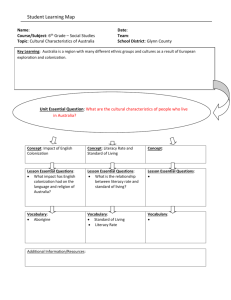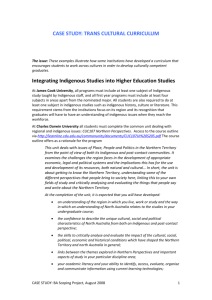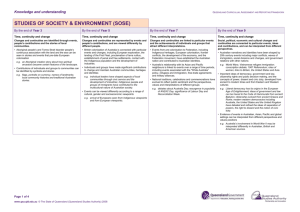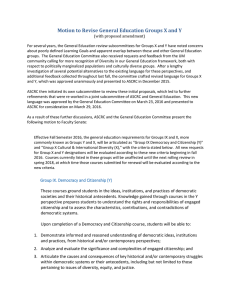SOSE - Queensland Curriculum and Assessment Authority
advertisement
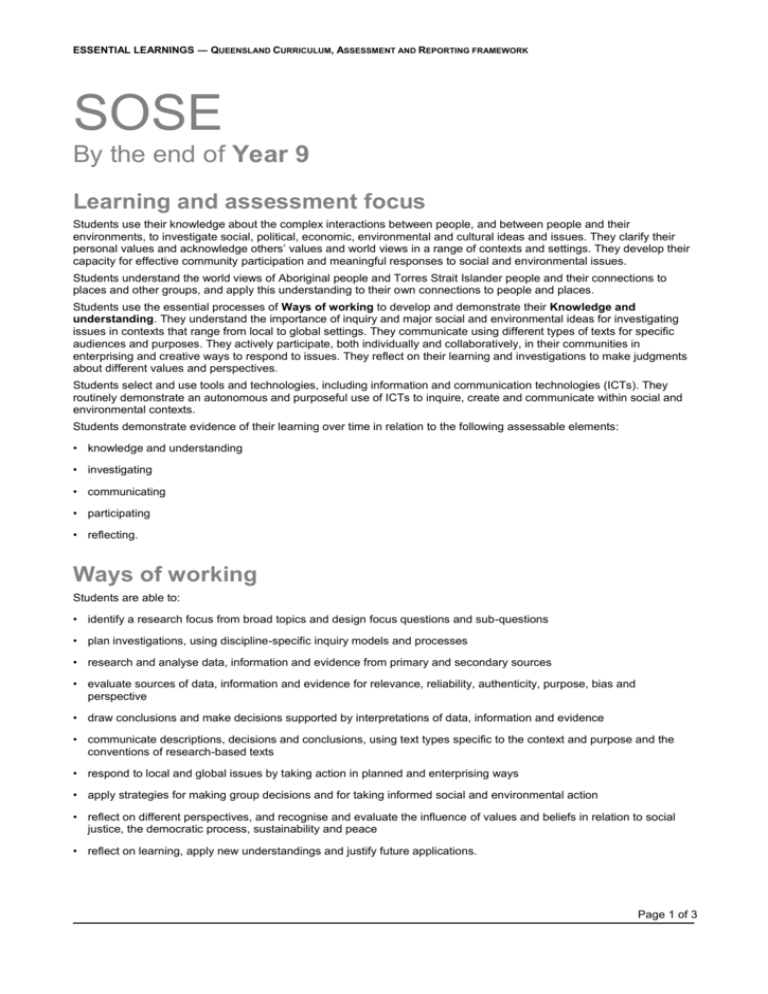
ESSENTIAL LEARNINGS ― QUEENSLAND CURRICULUM, ASSESSMENT AND REPORTING FRAMEWORK SOSE By the end of Year 9 Learning and assessment focus Students use their knowledge about the complex interactions between people, and between people and their environments, to investigate social, political, economic, environmental and cultural ideas and issues. They clarify their personal values and acknowledge others’ values and world views in a range of contexts and settings. They develop their capacity for effective community participation and meaningful responses to social and environmental issues. Students understand the world views of Aboriginal people and Torres Strait Islander people and their connections to places and other groups, and apply this understanding to their own connections to people and places. Students use the essential processes of Ways of working to develop and demonstrate their Knowledge and understanding. They understand the importance of inquiry and major social and environmental ideas for investigating issues in contexts that range from local to global settings. They communicate using different types of texts for specific audiences and purposes. They actively participate, both individually and collaboratively, in their communities in enterprising and creative ways to respond to issues. They reflect on their learning and investigations to make judgments about different values and perspectives. Students select and use tools and technologies, including information and communication technologies (ICTs). They routinely demonstrate an autonomous and purposeful use of ICTs to inquire, create and communicate within social and environmental contexts. Students demonstrate evidence of their learning over time in relation to the following assessable elements: • knowledge and understanding • investigating • communicating • participating • reflecting. Ways of working Students are able to: • identify a research focus from broad topics and design focus questions and sub-questions • plan investigations, using discipline-specific inquiry models and processes • research and analyse data, information and evidence from primary and secondary sources • evaluate sources of data, information and evidence for relevance, reliability, authenticity, purpose, bias and perspective • draw conclusions and make decisions supported by interpretations of data, information and evidence • communicate descriptions, decisions and conclusions, using text types specific to the context and purpose and the conventions of research-based texts • respond to local and global issues by taking action in planned and enterprising ways • apply strategies for making group decisions and for taking informed social and environmental action • reflect on different perspectives, and recognise and evaluate the influence of values and beliefs in relation to social justice, the democratic process, sustainability and peace • reflect on learning, apply new understandings and justify future applications. Page 1 of 3 ESSENTIAL LEARNINGS ― QUEENSLAND CURRICULUM, ASSESSMENT AND REPORTING FRAMEWORK Knowledge and understanding Time, continuity and change Social, political, economic and cultural changes and continuities are connected to particular events, ideas and contributions, and can be interpreted from different perspectives. • Australian narratives and identities have been shaped by 20th century events including major conflicts, waves of immigration, social divisions and changes, and government relations with other nations e.g. World Wars; Vietnamese refugee immigration; conscription debate; 1967 Referendum; roles of women; links to Britain, the United States and Asia. • Important ideas of democracy, government and law, citizenship rights and public decision making, and the concepts of power, dissent and civic duty, developed from ancient to modern times and from Eastern and Western cultures e.g. Liberal democracy has its origins in the European Age of Enlightenment; ideas of government and law can be traced to the Code of Hammurabi from ancient Babylon; citizenship evolved from ancient Greece and Rome; modern western democracies including Australia, the United States and the United Kingdom have debated and refined the ideas of separation of powers, the right to dissent and the notion of civic duty. • Evidence of events in Australian, Asian, Pacific and global settings can be interpreted from different perspectives and values positions e.g. Australia’s involvement in World War II may be interpreted differently in Australian, British and American sources. Place and space Environments are defined by spatial patterns, human and physical interactions, and sustainable practices can balance human activity and environmental processes. • Australia, the Asia–Pacific region and other global settings are defined by a range of natural characteristics and processes, including landforms, vegetation and climatic zones, and human activities, including cultural, economic and political activity. • Interrelationships between human activity and environments result in particular patterns of land and resource use, and can cause environmental problems e.g. overgrazing and erosion; overuse of fossil fuels and carbon dioxide emissions. • Governments and communities need to balance economic, social, political and environmental factors through sustainable development, consumption and production e.g. resource use and environmental impacts; logging and the survival of small communities dependent on that industry. • Physical environments are defined by spatial patterns, including the arrangement of elements on the Earth’s surface, the definable areas of the Earth’s surface, the space between different locations, and absolute and relative location. • Maps, including topographic, political and thematic maps, are developed with particular features, including scale, contour lines and human-created boundaries, and use the specific skills of observing, visualising, estimating, sketching and measuring. Page 2 of 3 ESSENTIAL LEARNINGS ― QUEENSLAND CURRICULUM, ASSESSMENT AND REPORTING FRAMEWORK Culture and identity Cultures and identities are shaped by a range of factors, and societies promote cohesion and diversity in different ways. • Group identities are influenced by different factors, including family, communities, nationality, socioeconomic factors and religious beliefs. • Cultural diversity in Australia is influenced by public opinion, media portrayals, government policies and the impacts of globalisation e.g. government cultural policies have included integration, segregation, assimilation, multiculturalism and restricted immigration; media images contribute to the homogenisation of youth culture; globalisation has caused a greater movement of peoples. • Community perceptions of Aboriginal cultures and Torres Strait Islander cultures have resulted in positive and negative responses to Indigenous people e.g. positive — efforts towards reconciliation, native title, greater awareness of Indigenous issues, improved access to services by Indigenous people negative — racism, discrimination, separation from land, denial of use of own language. • Contact between cultures has produced movements to improve democratic participation and citizenship rights for specific groups e.g. government policy and legislation to increase opportunities for participation in electoral and government processes for women, Indigenous people and young people. • Cultural research involves following protocols and acting sensitively e.g. acknowledging the ownership of Indigenous sources of knowledge; accessing sacred sites or places of significance through traditional custodians. Political and economic systems Societies consist of interconnected decision-making systems, institutions and processes based on principles and values. • Australia’s government systems are based on liberal democratic principles, including the “common good” and parliamentary elections, perform functions, including developing policy and formulating legislation, and have institutions and instruments, including the High Court and Acts of Parliament. • Australia’s legal and justice systems are based on principles, including an independent judiciary, perform functions, including the protection of rights, and use different types of law and courts. • Australian citizenship involves recognising global perspectives and balancing majority rule against respecting minority interests e.g. global citizenship involves making connections to people and issues in other parts of the world; respecting the rights of minorities to participate equally as citizens. • Australia’s relationships with other nations involve membership of international organisations and participation in global systems of law, diplomacy, human rights, trade and security e.g. Australia is a member of the United Nations, the Asia-Pacific Economic Forum, the Commonwealth Heads of Government Meeting and the International Whaling Commission. • Australia’s economic system is shaped by a range of economic activities, including production and consumption, and government regulation. Page 3 of 3

